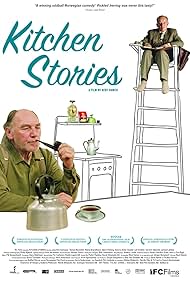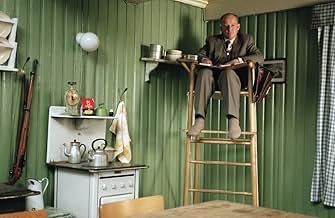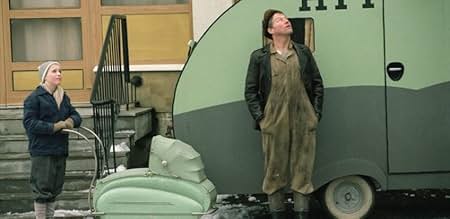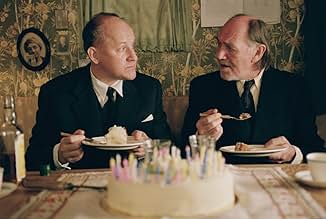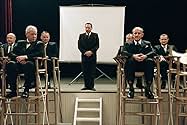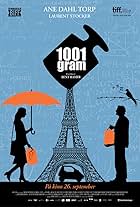IMDb RATING
7.3/10
8.8K
YOUR RATING
A scientific observer's job of observing an old cantankerous single man's kitchen habits is complicated by his growing friendship with him.A scientific observer's job of observing an old cantankerous single man's kitchen habits is complicated by his growing friendship with him.A scientific observer's job of observing an old cantankerous single man's kitchen habits is complicated by his growing friendship with him.
- Awards
- 8 wins & 6 nominations total
Gard B. Eidsvold
- Bakkerman
- (as Gard Eidsvold)
- Director
- Writers
- All cast & crew
- Production, box office & more at IMDbPro
Featured reviews
This movie pokes fun, in a very gentle way, at a whole lot of things. At the Swedes and their "Ikea-type" market research, at the Norwegians and their laconic ways, and at the strange ways of humans altogether. This movie manages to be moving without being sentimental or manipulative. What I mean here is that the element of manipulation that is quite obvious in many of the more sophisticated recent "feel good" movies I generally enjoy (you know the ones I mean - Cinema Paradiso, Billy Elliot etc.) is not in evidence here. We are getting at something pretty basic and human with "Kitchen Stories". The movie tracks the unlikely relationship that develops between the Swedish market researcher, sent to observe (and strictly forbidden to interact with the subject of his study) the kitchen ways of his crusty Norwegian bachelor "host". Sounds rather minimal but this is a movie that is as good as a movie can get. Perfect pacing, perfect acting, perfect camera work, perfect story. While the movie can be enjoyed on the tv, as video, I think that it is best seen on a larger screen in a movie theater because the visual impact is strong. You come out of this movie a happier person than went in and that is worth something these days !
Imagine your job entails watching the habits of the people in their kitchens, their comings and goings: from the oven to the fridge, from the washing machine to the cupboard... How come? Well, let's say you're an employee of an enterprise that's looking forward to optimize the arrangement of people's houses to make their life more comfortable (???). You just sit there and watch your assigned "specimen". No talking, no communication between you and him. Now imagine you're the "specimen", and that there's a man sit on your kitchen observing your behavior!!!
Yeah, it's such a crazy plot, but it comes in handy for the director to express his message: man is a social creature and everybody needs someone sometime.
A small movie about small people, calm and intimate. It will make you snore by the second sequence if you're looking for some action... Otherwise, if you don't mind about contemplative cinema, this movie's gonna leave you a nice taste in your mouth.
*My rate: 7/10
Yeah, it's such a crazy plot, but it comes in handy for the director to express his message: man is a social creature and everybody needs someone sometime.
A small movie about small people, calm and intimate. It will make you snore by the second sequence if you're looking for some action... Otherwise, if you don't mind about contemplative cinema, this movie's gonna leave you a nice taste in your mouth.
*My rate: 7/10
This film was a surprise since we went without any preconceptions, having avoided reading about it beforehand. It is a droll attempt at film making by Bent Hamer, the director, who collaborated on the scenario.
The film presents a story that on its surface seems to be one thing, but deep inside there is an ode to friendship between two different, but stoic Scandinavian men, Isak and Folke, whose lives become entwined as they discover how they are similar, despite of all appearances. The story is set in the bleak and snowy Norwegian winter.
In the end, Folke is a better man by having known Isak, the man who he doesn't understand at the beginning of the story, but who unknown to him, was always looking over him, without the other one knowing it.
The three principals are very well portrayed. This film will resonate with people that find themselves alone at the last stages of their lives, and how they are changed by opening up to perfect strangers who are going through the same thing themselves.
The film presents a story that on its surface seems to be one thing, but deep inside there is an ode to friendship between two different, but stoic Scandinavian men, Isak and Folke, whose lives become entwined as they discover how they are similar, despite of all appearances. The story is set in the bleak and snowy Norwegian winter.
In the end, Folke is a better man by having known Isak, the man who he doesn't understand at the beginning of the story, but who unknown to him, was always looking over him, without the other one knowing it.
The three principals are very well portrayed. This film will resonate with people that find themselves alone at the last stages of their lives, and how they are changed by opening up to perfect strangers who are going through the same thing themselves.
How do you make a film
no SELL the idea of a film, whose premise is the following? Take 1950 era Swedish scientists, whose goal is to find men who live alone in the wilderness and study their kitchen habits' at home for the purpose of building a more efficient living space for people. I am sure if any writer walking into Hollywood with that script would be instantly flogged before he even set foot in a studio executive boardroom. A story like this obviously seems to set itself up as a comedy, since the story is so obviously absurd, but what viewers come out with after witnessing this film is the great appreciation and the bonds the characters create. This is a truly touching masterful picture, from a premise that has the most bizarre source that I don't know how anyone could have even come up with. That premise is quite something, since it seems that the idea of studying male behavior in a kitchen in the backwoods of Norway is either going to be a complete disaster or something extremely memorable. Luckily it is the latter of the two. Isak Bjornsson is a scientist out to study a subject' named Folke who lives by himself and has literally no friends. Folke unwittingly is part of this experiment which involves Isak sitting in a giant chair overlooking his living space, as if he was the judge in a tennis match. Also Isak is supposed to follow certain rules set out by his employer. He is not to disturb Folke's living space, nor talk to him. If this isn't a unique bit of Scandinavian humor I don't know what is. If this film were to fall flat or even be just a short funny comedy, it would only fixate on the stupidity of this premise. Somehow a guy who sits in a log cabin miles away from civilization, who can put up with a stuffy repressed scientist whose main purpose is to write excruciating details of a man who literally spends his day doing nothing, is actually quite a funny situation for comedy. Kitchen Stories does not fail in that sense, but the ingeniousness is that Kitchen Stories is smarter than that.
The film suddenly takes the viewer to ask what the real purpose of these 2 men in the movie are and the focus provides and glaring and obvious point. They are essentially both alone in their lives for different reasons and they in a way need each other. But not of course in the sense of a dying love, but in a great sense of male camaraderie and caring that is essential to the idea of a great friendship
Gradually, the bond between scientist and subject breaks down, and both men start evolving a strange set of rules and create a friendship that comes off as the most genuine and heartwarming I've seen on screen since this year started.
As this relationship and some good subplots develop, the comedy takes another turn as Isak tries to hide from his boss ( a man who only dreams' of what the future possibilities of kitchens may look like), that he has engaged his subject in what is obviously, caring' humanity. The nerve!
I loved this film from the moment it started till its tender conclusion. It had only a short run in my area, and even after what must have been several months since I've seen it, I still think about it and a giant smile comes across my face.
It is touching, heartwarming, very funny, and just flat out great. It is the best film I have seen so far this year. If you ever get a chance to see it, go immediately. It shows the perfect beauty of the bond between us all as people, in the most kooky, unique bizarre way. And that in itself is pure genius
Rating 10 out of 10
The film suddenly takes the viewer to ask what the real purpose of these 2 men in the movie are and the focus provides and glaring and obvious point. They are essentially both alone in their lives for different reasons and they in a way need each other. But not of course in the sense of a dying love, but in a great sense of male camaraderie and caring that is essential to the idea of a great friendship
Gradually, the bond between scientist and subject breaks down, and both men start evolving a strange set of rules and create a friendship that comes off as the most genuine and heartwarming I've seen on screen since this year started.
As this relationship and some good subplots develop, the comedy takes another turn as Isak tries to hide from his boss ( a man who only dreams' of what the future possibilities of kitchens may look like), that he has engaged his subject in what is obviously, caring' humanity. The nerve!
I loved this film from the moment it started till its tender conclusion. It had only a short run in my area, and even after what must have been several months since I've seen it, I still think about it and a giant smile comes across my face.
It is touching, heartwarming, very funny, and just flat out great. It is the best film I have seen so far this year. If you ever get a chance to see it, go immediately. It shows the perfect beauty of the bond between us all as people, in the most kooky, unique bizarre way. And that in itself is pure genius
Rating 10 out of 10
As a result of a study in the 1950s in which efficiency experts at the Home Research Institute observed the kitchen habits of Swedish housewives to come up with a better workspace design, eighteen men are transported in caravans to farms in Norway to observe the cooking habits of Norwegian single men. Kitchen Stories, a quirky comedy co-written by Swedish director Bent Hamer and Norway's Jörgen Bergmark, depicts the relationship between two elderly single men, a relationship in which the observer ends up being the observed. The film is similar, in its deadpan humor and offbeat characters, to the work of Aki Kaurismäki, but without the Finnish director's overbearing self-consciousness.
The scientists wear white lab coats and carry clipboards, seemingly poised for an ET-like invasion. The observers, however, must live outside the homes of their subjects in small trailers and are not allowed to talk, drink, or otherwise interact with their subjects. Some, however, are not willing subjects. One of the scientists, Folke, a Swede (Tomas Norström), draws Isak (Joachim Calmeyer), an antisocial Norwegian farmer used to living in solitude. Isak at first refuses to let Folke into his house, resentful that the horse he was promised in return for his participation turned out to be a figurine. Folke, however, eventually gains access to the kitchen and sits every day perched in his high observation chair, recording Isak's every movement like the Lord High Executioner until Isak decides to take his hot plate up to his bedroom to frustrate his unwelcome guest.
The sly Isak drills a hole through the upstairs bedroom floor and now secretly watches Folke in the kitchen. When they start conversing, each man insists on speaking his own language (not shown by the subtitles) as if to doggedly maintain their separate identities. Gradually they become friends, breaking through the barriers in their life that have imposed a limiting solitude. They begin first by drinking coffee in the morning, sharing a bit of their background, and then celebrating Isak's birthday with cake and bourbon whiskey. Their interaction, of course, is against the rules of the study, and there are consequences for Folke. His life, however, acquires new meaning the more willing he is to take risks and share himself openly. Kitchen Stories is a small film, but one that is warmhearted and thoroughly enjoyable, a work that celebrates the small pleasures in just being alive without trying to be profound or seduce us with blatant emotional appeals.
The scientists wear white lab coats and carry clipboards, seemingly poised for an ET-like invasion. The observers, however, must live outside the homes of their subjects in small trailers and are not allowed to talk, drink, or otherwise interact with their subjects. Some, however, are not willing subjects. One of the scientists, Folke, a Swede (Tomas Norström), draws Isak (Joachim Calmeyer), an antisocial Norwegian farmer used to living in solitude. Isak at first refuses to let Folke into his house, resentful that the horse he was promised in return for his participation turned out to be a figurine. Folke, however, eventually gains access to the kitchen and sits every day perched in his high observation chair, recording Isak's every movement like the Lord High Executioner until Isak decides to take his hot plate up to his bedroom to frustrate his unwelcome guest.
The sly Isak drills a hole through the upstairs bedroom floor and now secretly watches Folke in the kitchen. When they start conversing, each man insists on speaking his own language (not shown by the subtitles) as if to doggedly maintain their separate identities. Gradually they become friends, breaking through the barriers in their life that have imposed a limiting solitude. They begin first by drinking coffee in the morning, sharing a bit of their background, and then celebrating Isak's birthday with cake and bourbon whiskey. Their interaction, of course, is against the rules of the study, and there are consequences for Folke. His life, however, acquires new meaning the more willing he is to take risks and share himself openly. Kitchen Stories is a small film, but one that is warmhearted and thoroughly enjoyable, a work that celebrates the small pleasures in just being alive without trying to be profound or seduce us with blatant emotional appeals.
Storyline
Did you know
- TriviaAt the beginning of the film, Malmberg (a Swede) becomes ill after having to drive on the right side of the road in Norway. Today both countries drive on the right. In 1967, Sweden switched to the right because making two versions of cars like Volvos and Saabs for domestic and foreign sales was inefficient. Also, there are many unguarded, unmarked border crossings points (unlike the crossing in the film); people would not realize which country they were in and sometimes ended up driving on the wrong side.
- SoundtracksVisa Från Utanmyra
Performed by Jan Johansson
- How long is Kitchen Stories?Powered by Alexa
Details
- Release date
- Countries of origin
- Languages
- Also known as
- Kitchen Stories
- Production companies
- See more company credits at IMDbPro
Box office
- Gross US & Canada
- $351,235
- Opening weekend US & Canada
- $48,103
- Feb 22, 2004
- Gross worldwide
- $2,823,472
- Runtime1 hour 35 minutes
- Color
- Sound mix
- Aspect ratio
- 1.85 : 1
Contribute to this page
Suggest an edit or add missing content

